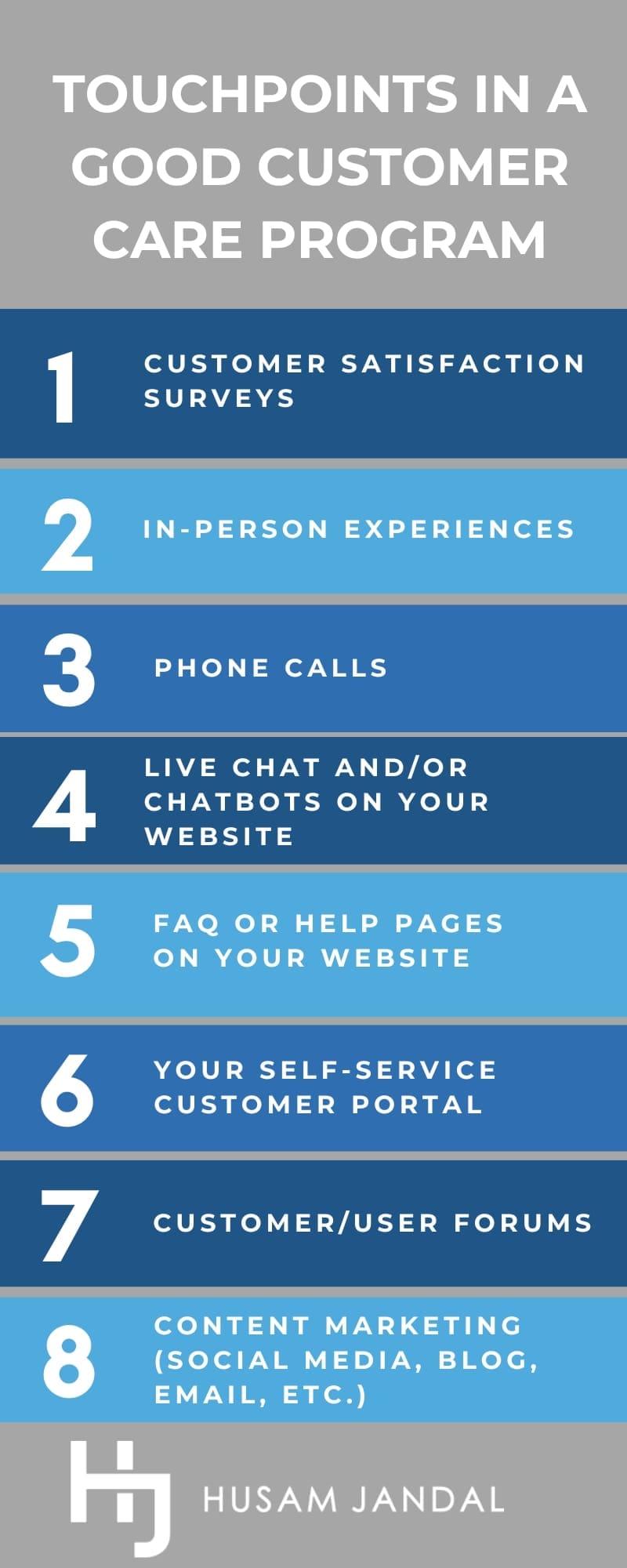 Does your business have a customer care program? Not a customer service department or support but dedicated customer care? Although the terms are often used interchangeably, customer care management is different. Understanding what sets it apart, applying best practices, and building it into every level of your business is crucial to success.
Does your business have a customer care program? Not a customer service department or support but dedicated customer care? Although the terms are often used interchangeably, customer care management is different. Understanding what sets it apart, applying best practices, and building it into every level of your business is crucial to success.
I’ll go over some of the background and best practices on this page so it’s easier to build a strong customer care program for your business.
What is Customer Care?
Customer care refers to the way people are treated when they interact with your company. This includes the entire customer journey and every touchpoint throughout.
Customer Care vs. Customer Service
Customer care and customer service may seem similar at a glance. However, customer service is focused on troubleshooting or solving an issue. Customer care is a part of the customer service experience and relates to meeting the person’s emotional needs to build stronger customer relationships.
Let’s say that you operate a retail store, and someone places an order that includes a dress. The person calls after the order is received and says everything except for the dress came. She notes that she’s upset because she needed the dress for a special event tomorrow. Your customer service agent may then issue a refund for the missing dress and consider the matter resolved. However, an agent invested in customer care would have heard the customer’s other concern: the woman needs a dress tomorrow. A refund isn’t sufficient to deliver great customer care. The agent gives the woman a choice as to whether she’d like a refund or wants a new dress overnighted at no additional cost. The latter option is obviously going to leave a lasting positive impression on the customer.
Customer Care vs. Customer Experience
It’s easy to mix customer care with customer experience too. However, customer experience is a broad term. It’s everything that a customer experiences with your brand versus the emotional ties created with great care.
Let’s say someone visits your website. They find exactly what they want and complete their purchase without issue. Their experience was top-notch. However, no customer care was provided because the person did not interact with a representative of your company.
We can also look at it from a different angle. Let’s say the customer goes to your website and can’t find an item. They click the online chat button and tell your agent what they want. The agent listens, pitches a few products that will work, and then manually processes the transaction for the customer via the chat. The individual received excellent customer care and, as a result, had a positive experience.
What is Social Customer Care?
Roughly seven-in-ten Americans use at least one social network, according to Pew Research. More than three-quarters of small businesses use social media for marketing, too, per BIA/Kelsey. Each time your business posts is likely a form of customer care. A key benefit of social media customer care is the fact that if you’re involved in the public eye, you build relationships and take care of customers, not just with the person you’re directly serving but with everyone who sees your messages.
Reactive Customer Care
Nearly 70 percent of social media users have used a network for customer service concerns, according to Social Media Today. One in three say they prefer it over the phone or email communication. In these cases, the individual may send a direct message, post on the business’s page, post about the business, leave a review, or create some other form of content that equates to an SOS. When the business responds in a mindful, relationship-building way, it’s referred to as a reactive form of customer care service.
Proactive Customer Care
Businesses don’t need to wait for someone to reach out with a concern to provide excellent customer care. That’s why having frequent customer satisfaction surveys is crucial for the success of any customer care program. In addition, tips, guides, and other forms of helpful content also fit within the bracket, though it’s referred to as proactive customer care.
Why Customer Care is Important to Marketers
By now, it should be clear that customer care is a huge part of the social media marketer’s job. But, it’s important to note that 75 percent of customers expect consistent experiences across multiple channels, according to Search Engine Land. Moreover, 73 percent will switch brands if they don’t get a consistent experience across channels.
In other words, proactive customer care techniques should be applied consistently to all your marketing efforts. This is why I build it into my strategies and typically recommend that the companies I consult keep crucial roles like social media marketing in-house.
Touchpoints in a Good Customer Care Program

A strong program addresses digital marketing customer care alongside other channels, such as physical experiences. As you shore yours up, make sure to address:
- Customer satisfaction surveys
- In-person experiences
- Phone calls
- Live chat and/or chatbots on your website
- FAQ or help pages on your website
- Your self-service customer portal
- Customer/user forums
- Content marketing (social media, blog, email, etc.)
Benefits of a Customer Care Program
Businesses with a solid customer care program prime themselves for success.
Boost Your Online Reputation and Brand Image
I’ve spoken about the importance of having a digital crisis management plan and how to set one up. In this digital age, brands can go viral for all the wrong reasons in the blink of an eye. The good news is that your brand can also become known for providing great customer care and, if you play your cards right, may even go viral for it.
To give a real-life example, a well-known pizza chain received a message from a soldier stationed overseas asking if they’d accept his order if he sent his wife a pizza for her birthday. The restaurant not only obliged but made the pizza in the shape of a heart and delivered balloons along with it. The story went viral and was even picked up by news stations.
Set Yourself Apart from Competitors
Brands that become known for customer care set themselves apart from others and can gain a major competitive advantage.
Take FedEx, for example. The internet is full of positive stories, like when FedEx tracked down a man in Tokyo despite not having an address. Unless you’ve personally had a bad experience with the company, you probably associate them with great service even if you don’t regularly ship with them.
Helps You Deal with Customer Complaints
When you have the right people and systems in place, you can catch and manage customer complaints before they become a serious issue.
FedEx shines here as well. When the pop singer Madonna took to Twitter because the company wouldn’t release a package to her over identity concerns, more than 62,000 people liked her post, and nearly 2,000 weighed in. Although this could have been a PR nightmare for the brand, an agent swiftly stepped in, demonstrated concern, and moved the conversation to a private message.
Improved Customer Loyalty and Retention
A poor customer experience will cause nearly two-thirds of customers to leave a brand they previously trusted, according to Emplifi research. After two bad experiences, 86 percent will bail. Your business will retain more clients and boost loyalty by delivering great experiences fueled by a strong customer care program.
Increased Revenue
As highlighted in “7 Effective Strategies for Increasing Customer Stickiness,” more than two-thirds of a typical company’s business comes from existing customers. A five percent boost in retention can boost profit by up to 95 percent, too. In addition to improving customer loyalty and a higher customer retention rate, customer care helps businesses differentiate themselves from the competition, resulting in significant revenue growth.
Get Help Developing or Improving Your Customer Care Program
Customer care and digital marketing are undeniably linked. However, organizations building out their customer care programs often face challenges related to budgets, talent sourcing and management, and technology. If you’re facing difficulties in these areas or would like help improving your digital marketing strategy, please contact me for a complimentary consultation.





































































